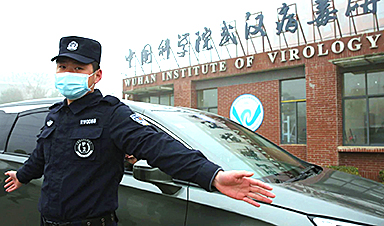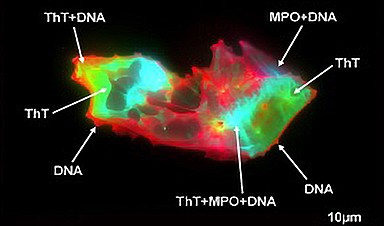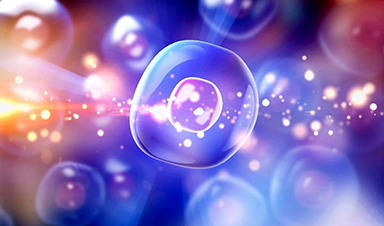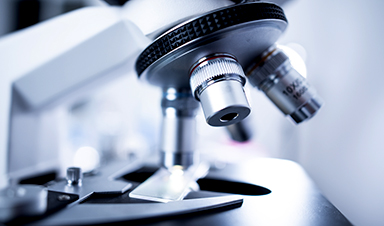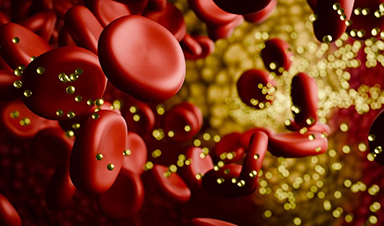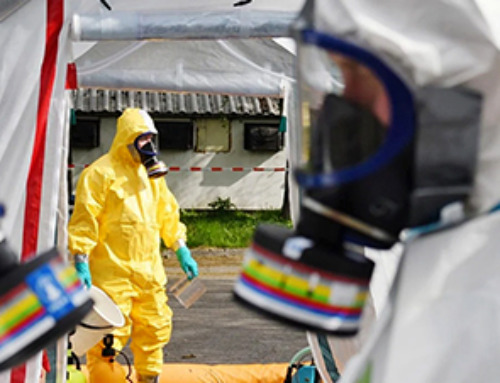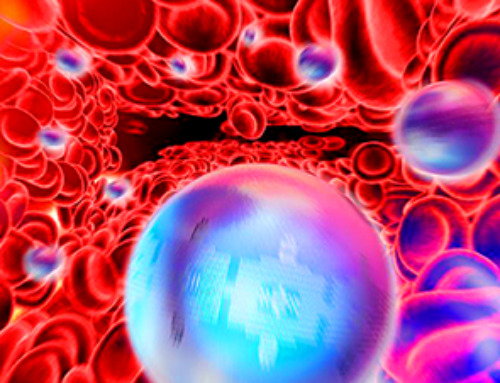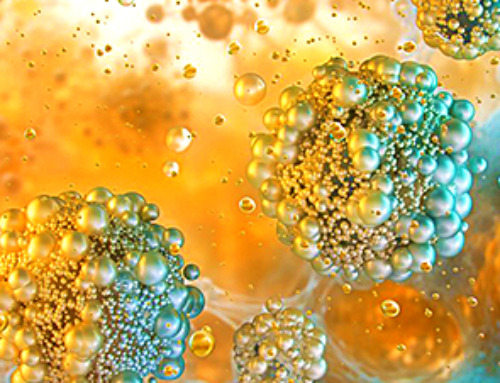For many scientists, challenging the idea that SARS-CoV-2 has natural origins is seen as career suicide. But a vocal few say it shouldn’t be disregarded or lumped in with conspiracy theories.
Nikolai Petrovsky was scrolling through social media after a day on the ski slopes when reports describing a mysterious cluster of pneumonia cases in Wuhan, China, caught his eye. It was early January 2020, and Petrovsky, an immunologist, was at his vacation getaway in Keystone, Colorado, which is where he goes most years with his family to flee the searingly hot summers at home in South Australia. He was soon struck by an odd discrepancy in how the pneumonia cases were portrayed. Chinese authorities and the World Health Organization were saying there was nothing to worry about, but locals in the area, he says, were posting about “bodies being stretchered out of houses in Wuhan and police bolting apartment doors shut.”
Petrovksy is a professor at Flinders University, near Adelaide, and he is also founder and chairman of a company called Vaxine that develops immunizations for infectious diseases, among other projects. Since 2005, he’s received tens of millions of dollars in funding from the US National Institutes of Health to support the development of vaccines and compounds called adjuvants that boost their effects. After Chinese scientists posted a draft genome of the novel coronavirus SARS-CoV-2, the disease culprit in Wuhan, Petrovksy—who by this time had put skiing on the back burner to work from his Colorado home office—directed his colleagues down under to run computer modeling studies of the viral sequence, a first step toward designing a vaccine.
This generated a startling result: the spike proteins studding SARS-CoV-2 bound more tightly to their human cell receptor, a protein called ACE2, than target receptors on any other species evaluated. In other words, SARS-CoV-2 was surprisingly well adapted to its human prey, which is unusual for a newly emerging pathogen. “Holy shit, that’s really weird,’” Petrovsky recalls thinking.
As Petrovsky considered whether SARS-CoV-2 might have emerged in lab cultures with human cells, or cells engineered to express the human ACE2 protein, a letter penned by 27 scientists appeared suddenly on February 19 in the prestigious medical journal The Lancet. The authors insisted that SARS-CoV-2 had a natural origin, and they condemned any alternate hypotheses as conspiracy theories that create only “fear, rumors, and prejudice.”
Petrovksy says he found the letter infuriating. Conspiracy theorists is “the last thing we were,” he says, “and it looked to be pointing at people like us.”
Last month, a team of international scientists completed a month-long visit to Wuhan to investigate SARS-CoV-2’s origins. Convened by the WHO, and closely monitored by Chinese authorities, the team concluded initially that a lab leak was so unlikely that further investigations of it were unnecessary. The WHO’s director general later walked that statement back, claiming that “all hypotheses remain open and require further analysis and studies.” A group of 26 scientists, social scientists, and science communicators—Petrovksy among them—have now signed their own letter arguing that WHO investigators lacked “the mandate, the independence, or the necessary accesses” to determine whether or not SARS-CoV-2 could have been the result of a laboratory incident.
The WHO investigation follows a year during which debates over SARS-CoV-2’s origins turned increasingly acrimonious. Chinese officials were, and still are, unwilling to provide information that might settle lingering questions…
Image Credit: AP
Post by Amanda Scott, NA CEO. Follow her on twitter @tantriclens
Thanks to Heinz V. Hoenen. Follow him on twitter: @HeinzVHoenen
News
Fever-Proof Bird Flu Variant Could Fuel the Next Pandemic
Bird flu viruses present a significant risk to humans because they can continue replicating at temperatures higher than a typical fever. Fever is one of the body’s main tools for slowing or stopping viral [...]
What could the future of nanoscience look like?
Society has a lot to thank for nanoscience. From improved health monitoring to reducing the size of electronics, scientists’ ability to delve deeper and better understand chemistry at the nanoscale has opened up numerous [...]
Scientists Melt Cancer’s Hidden “Power Hubs” and Stop Tumor Growth
Researchers discovered that in a rare kidney cancer, RNA builds droplet-like hubs that act as growth control centers inside tumor cells. By engineering a molecular switch to dissolve these hubs, they were able to halt cancer [...]
Platelet-inspired nanoparticles could improve treatment of inflammatory diseases
Scientists have developed platelet-inspired nanoparticles that deliver anti-inflammatory drugs directly to brain-computer interface implants, doubling their effectiveness. Scientists have found a way to improve the performance of brain-computer interface (BCI) electrodes by delivering anti-inflammatory drugs directly [...]
After 150 years, a new chapter in cancer therapy is finally beginning
For decades, researchers have been looking for ways to destroy cancer cells in a targeted manner without further weakening the body. But for many patients whose immune system is severely impaired by chemotherapy or radiation, [...]
Older chemical libraries show promise for fighting resistant strains of COVID-19 virus
SARS‑CoV‑2, the virus that causes COVID-19, continues to mutate, with some newer strains becoming less responsive to current antiviral treatments like Paxlovid. Now, University of California San Diego scientists and an international team of [...]
Lower doses of immunotherapy for skin cancer give better results, study suggests
According to a new study, lower doses of approved immunotherapy for malignant melanoma can give better results against tumors, while reducing side effects. This is reported by researchers at Karolinska Institutet in the Journal of the National [...]
Researchers highlight five pathways through which microplastics can harm the brain
Microplastics could be fueling neurodegenerative diseases like Alzheimer's and Parkinson's, with a new study highlighting five ways microplastics can trigger inflammation and damage in the brain. More than 57 million people live with dementia, [...]
Tiny Metal Nanodots Obliterate Cancer Cells While Largely Sparing Healthy Tissue
Scientists have developed tiny metal-oxide particles that push cancer cells past their stress limits while sparing healthy tissue. An international team led by RMIT University has developed tiny particles called nanodots, crafted from a metallic compound, [...]
Gold Nanoclusters Could Supercharge Quantum Computers
Researchers found that gold “super atoms” can behave like the atoms in top-tier quantum systems—only far easier to scale. These tiny clusters can be customized at the molecular level, offering a powerful, tunable foundation [...]
A single shot of HPV vaccine may be enough to fight cervical cancer, study finds
WASHINGTON -- A single HPV vaccination appears just as effective as two doses at preventing the viral infection that causes cervical cancer, researchers reported Wednesday. HPV, or human papillomavirus, is very common and spread [...]
New technique overcomes technological barrier in 3D brain imaging
Scientists at the Swiss Light Source SLS have succeeded in mapping a piece of brain tissue in 3D at unprecedented resolution using X-rays, non-destructively. The breakthrough overcomes a long-standing technological barrier that had limited [...]
Scientists Uncover Hidden Blood Pattern in Long COVID
Researchers found persistent microclot and NET structures in Long COVID blood that may explain long-lasting symptoms. Researchers examining Long COVID have identified a structural connection between circulating microclots and neutrophil extracellular traps (NETs). The [...]
This Cellular Trick Helps Cancer Spread, but Could Also Stop It
Groups of normal cbiells can sense far into their surroundings, helping explain cancer cell migration. Understanding this ability could lead to new ways to limit tumor spread. The tale of the princess and the [...]
New mRNA therapy targets drug-resistant pneumonia
Bacteria that multiply on surfaces are a major headache in health care when they gain a foothold on, for example, implants or in catheters. Researchers at Chalmers University of Technology in Sweden have found [...]
Current Heart Health Guidelines Are Failing To Catch a Deadly Genetic Killer
New research reveals that standard screening misses most people with a common inherited cholesterol disorder. A Mayo Clinic study reports that current genetic screening guidelines overlook most people who have familial hypercholesterolemia, an inherited disorder that [...]
